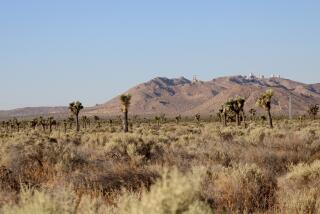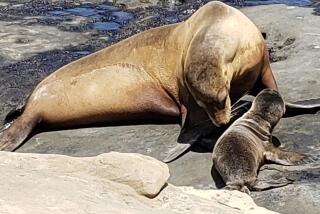War Stories From Ecology’s Archdruid : FOR EARTH’S SAKE: The Life and Times of David Brower <i> by David Brower (Gibbs Smith: $24.95; 527 pp., illustrated) </i>
Dave Brower is America’s most charismatic conservationist. Some say--I among them--that he has accomplished more through the force of one man’s will than any of his breed since John Muir. At age 77, he leads the pack for the title of America’s most arrogant, opinionated, pig-headed and autocratic conservationist as well.
Brower is never dull. This man John McPhee so aptly dubbed nature’s “Archdruid” has been trying, by his own admission, to produce an autobiography for years. “For Earth’s Sake” is half the loaf, revved up to make the Earth Day publication tie-in; Part II is scheduled for fall.
What Brower offers is mostly recycled essays from his years of editorializing for the Sierra Club Bulletin and Friends of the Earth’s Not Man Apart, spliced with contemporary annotation and transition. Another environmental curmudgeon, Edward Abbey, used the same recycling trick time after time and got away with it for the same reason that Brower will in “For Earth’s Sake”: It’s damned good material. Pieces dating back more than 40 years will now find a larger audience than Sierra Club historians.
Brower grew up in Berkeley, where his father taught at the university. The unspoiled hills and streams behind campus were his introduction to nature, and some of Berkeley’s larger boulders his initiation into climbing. For all I know, Brower’s ascents of Founder’s Rock may have marked the founding of that city’s renown for its mountaineers and rock climbers. He was an avid butterfly collector, and made his acquaintance with scientific terminology, population biology, and ecology in that way. By age 6, he was car-camping with his family in the Sierra Nevada. Brower also loved fast cars: His claimed record of 3 hours 25 minutes from Yosemite to Berkeley in a 1934 Plymouth nearly matches my own reckless time on modern wheels and freeways!
Brower failed in one area about which he is still sensitive: He dropped out of UC Berkeley as a youth and never did graduate from college. That failure may have catalyzed Brower’s view of himself--despite his fame--as outsider, and initiated his chronic distrust of experts, especially governmental ones.
It was the Sierra Club that focused Brower’s unformed conservation and provided his first and most important platform. He returned the favor by molding a local nature and outdoor club into a sophisticated and powerful nationwide force for conservation.
Dams loom large in Brower’s legend, and they were the anvil on which Brower hammered the club into a modern social force. Preceding Brower, the damming of Yosemite’s Hetch-Hetchy Valley had ripped the nascent Sierra Club apart. When the wounds had healed, the legend of Hetch-Hetchy gave the club the courage to oppose damming the Kings River, and gave us Kings Canyon National Park instead.
Imminent drowning of Dinosaur National Monument by the proposed Echo Park dam and reservoir in 1954 fully brought out Brower’s immense talent at writing, speech making and playing politics. For the first time, he ruthlessly dragged agencies such as the Bureau of Reclamation and the Army Corp of Engineers into the public arena and damned them.
A few years later, in a bid to appear more conciliatory and in dire fear of losing the Grand Canyon itself, the club and Brower traded away Glen Canyon Dam. It was a terrible mistake, says Brower: “I asked Dave Brower why he just sat, and have continued to ask him. He has no answer. . . . It was not that he had not heard, from those who knew, how beautiful Glen Canyon was. It was not that he thought Glen Canyon Dam was necessary, because he knew it was not. . . . “
Those were heady years. By way of expiation, the Sierra Club published an exhibit format book about Glen Canyon: “The Place No One Knew.” Brower: “ . . . the moral is simple: Progress need not deny to the people their inalienable right to be informed and to choose. In Glen Canyon the people never knew what the choices were. Next time, in other stretches of the Colorado, on other rivers that are still free, and wherever there is wildness that can be part of our civilization instead of victim to it, the people need to know before a bureau’s elite decide to wipe out what no one can replace.” Not blind opposition to progress, but opposition to blind progress.
When flooding Grand Canyon became an issue again, Brower was ready with another book, “Time and the River Flowing: Grand Canyon.” Full-page ads in major newspapers were the next weapon Brower tried. The ads brought waves of new members to the Sierra Club, people who joined for conservation rather than hiking company, and they cost the club its tax-exempt status.
By no means all who experienced the transition were grateful. In 1969, revolution completed, the Sierra Club fired Brower as executive director and premier--an episode which Brower headlines “How the Sierra Club Misuses Power and Talent, or How to Avoid the Four-Letter B-Word (BOLD).” The club is so eager to appear reasonable that it goes soft, undercuts the strong grass-roots efforts of chapters, groups and other organizations--as if the new professionalization and prioritization require rampant tenderization.
Undaunted, Brower created Friends of the Earth in his own radical image. Scarcely a decade later, a mature and successful organization, FOE would likewise toss out Brower. FOE could no longer function as his fief. Today, Brower’s mouthpiece is Earth Island Institute.
In his eighth decade, Brower is utterly unbowed. A few years back he was among the first to back Interior Secretary Hodel’s proposal to drain Hetch-Hetchy. The conservation groups were late and weak in supporting it, not trusting Hodel and his motives. “The city’s total revenue from power from its Hetch-Hetchy project’s origin until now has far exceeded the cost of the facilities to produce it,” he writes, “and that excess has in effect been a free ride for San Francisco at a substantial cost to the people who have been denied the intangible benefits of Hetch- Hetchy Valley for all these years.
“We are not talking about just ‘a campground,’ as Mayor Feinstein is reported to have described Hetch-Hetchy. We are talking about an integral part of a national park that belongs not to San Francisco, not to California, not to the United States but to the world as part of the World Heritage. San Francisco owes us this one. It took Hetch- Hetchy under false pretenses in the first place. The city claimed that no other site would do, and that was false. . . .”
Brower’s whimsy and casual approach to facts, his assumption that agency employees are Philistine can be maddening. At times, Brower is simply inexplicable. For some perverse reason of his own, he credits improvements in Yosemite Valley to the Curry Co., fabled in profit margin, rather than to his much benighted National Park Service, which has fought Curry to reduce the traffic and its impact.
Brower once lived in Yosemite Valley for three years, working for Yosemite Park and Curry Co. He was fired by the company, yet is “impressed by its managers’ concern for the valley. Even more so now, as I marvel at the genius with which the impact of 6 million human feet is kept to a minimum.”
I don’t know what we would have done without him.
More to Read
Sign up for Essential California
The most important California stories and recommendations in your inbox every morning.
You may occasionally receive promotional content from the Los Angeles Times.










